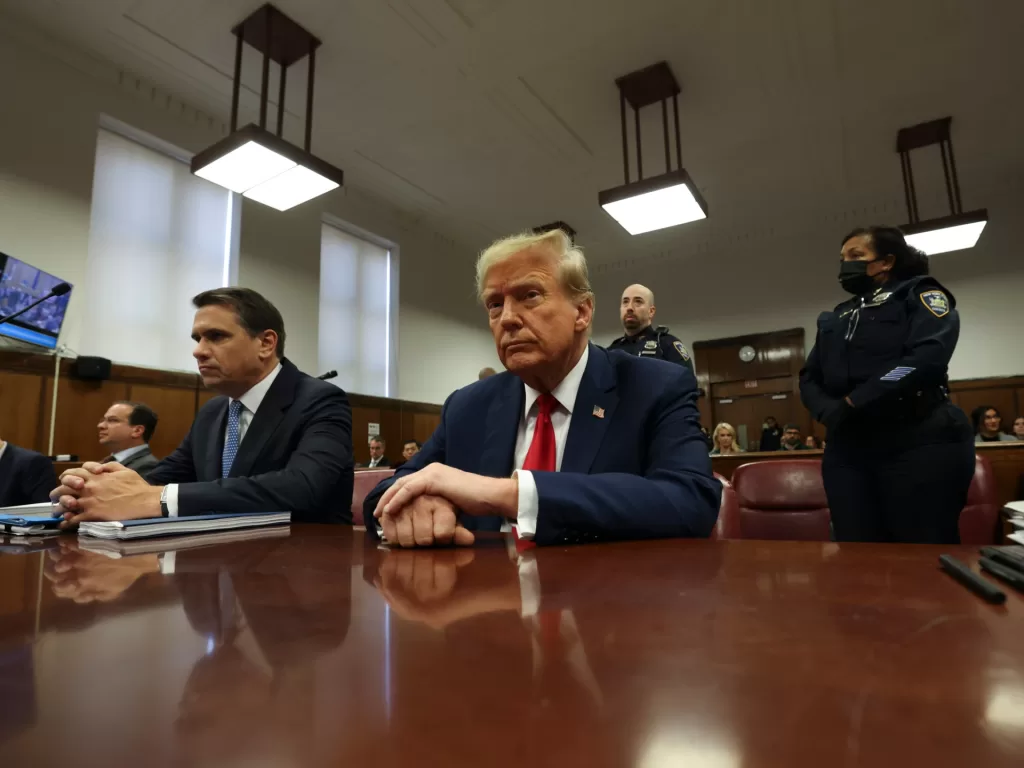The plan was struck in the run-up to the 2016 election when Trump was locked in a tight race with Hilary Clinton, his Democratic rival for the White House. Prosecutors have said the attempt at damage control led to hush-money payments made to former adult film star Stormy Daniels, who said she had a sexual relationship with Trump. The Manhattan District Attorney alleged that Trump falsified business documents to cover up the payments, and that the payment was part of a broader scheme to influence the 2016 election.
Trump, the presumptive 2024 Republican nominee, has denied that he had an affair with Daniels. He has been charged with 34 felony counts of falsifying business documents related to the payments made to Daniels, representing the first time in US history that an ex-president has faced criminal charges.
The falsification charges specifically relate to the alleged mislabelling of repayments that Trump made to his lawyer, Michael Cohen, who had fronted the $130,000 paid to Daniels in return for her silence. But for the felony charges to stick, prosecutors must convince a jury that the misrepresentations were done with the intent to commit another crime.
In opening statements on Monday, Assistant District Attorney Matthew Colangelo indicated that prosecutors would focus on an alleged wider scheme to “undermine the integrity” of 2016 presidential election.
Trump’s defence, meanwhile, said the former president is innocent, with his lawyer, Todd Blanche, arguing that “there’s nothing wrong with trying to influence an election … It’s called democracy”.
Prosecutors began to question David Pecker, the National Enquirer’s former publisher and a longtime friend of Trump’s, on Tuesday in an attempt to establish a pattern of Trump’s behaviour.
Beyond the payments to Daniels, prosecutors have also detailed two other instances where Trump allegedly sought to stifle negative stories through his connection with Pecker, who edits the tabloid that is known for publishing accounts of scandalous celebrity affairs and misbehaviour.
The payments included $150,000 by American Media – the parent company of the National Enquirer – to Karen McDougal, who also alleged an affair with Trump. The company has acknowledged the payment was specifically used to buy and bury the story.
American Media also paid a Trump Tower doorman $30,000 for a story claiming Trump had fathered a child out of wedlock.
The defence has argued that neither hush-money payments nor the so-called “catch and kill” schemes are in and of themselves illegal.
Prosecutors have alleged that the coordination between Pecker and Trump – and the timing of the catch-and-kill scheme in the final weeks of the 2016 presidential election when Trump was facing political fallout from a separate scandal – were evidence of a larger criminal effort under New York law “to promote or prevent the election of any person to a public office by unlawful means”.
They have also argued the falsifications of documents related to the hush money were paid to cover up violations of federal campaign finance law and New York state tax law.
But before any witness took the stand on Tuesday, the proceedings began with a debate about a gag order Judge Juan Merchan placed on Trump last month, which prohibited the former president from speaking or posting on social media about any of the potential witnesses in the trial.
Prosecutors alleged Trump has repeatedly violated that order and called for Merchan to take action against him.
The defence claimed Trump’s social media posts were defending against personal attacks.
In one back-and-forth, Judge Merchan warned Trump’s lawyer Blanche “You’re losing all credibility with the court.”
During a break, Trump took to his Truth Social platform to condemn the judge as “highly conflicted”.
“Everybody is allowed to talk and lie about me, but I am not allowed to defend myself?” he wrote. “This is a kangaroo court; the judge should recuse himself.”
While Trump currently faces three other criminal cases, the New York trial is the only one expected to finish before the November election.
In Georgia, Trump faces state charges related to an alleged campaign to pressure elections officials to change the state’s vote count in the 2020 election.
He faces a federal criminal case in Florida related to classified documents he allegedly removed from the White House and a separate federal case in Washington, DC related to allegations that he tried to overturn the 2020 election results.
